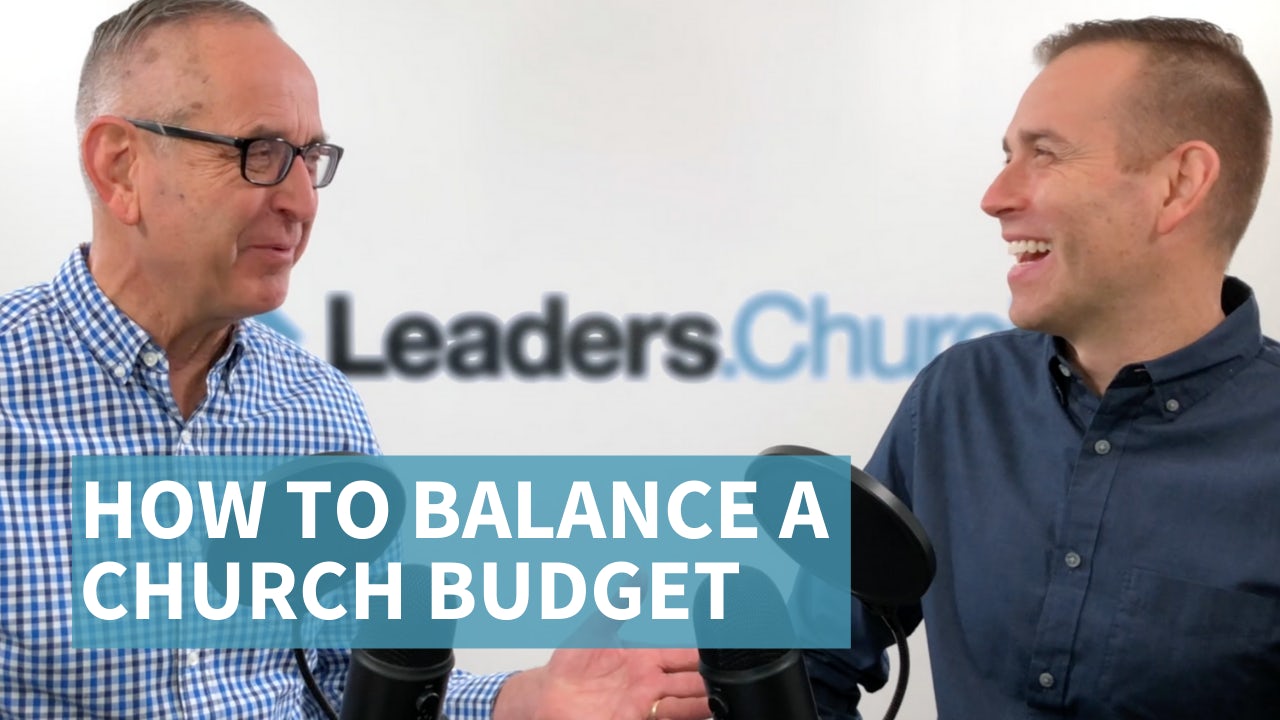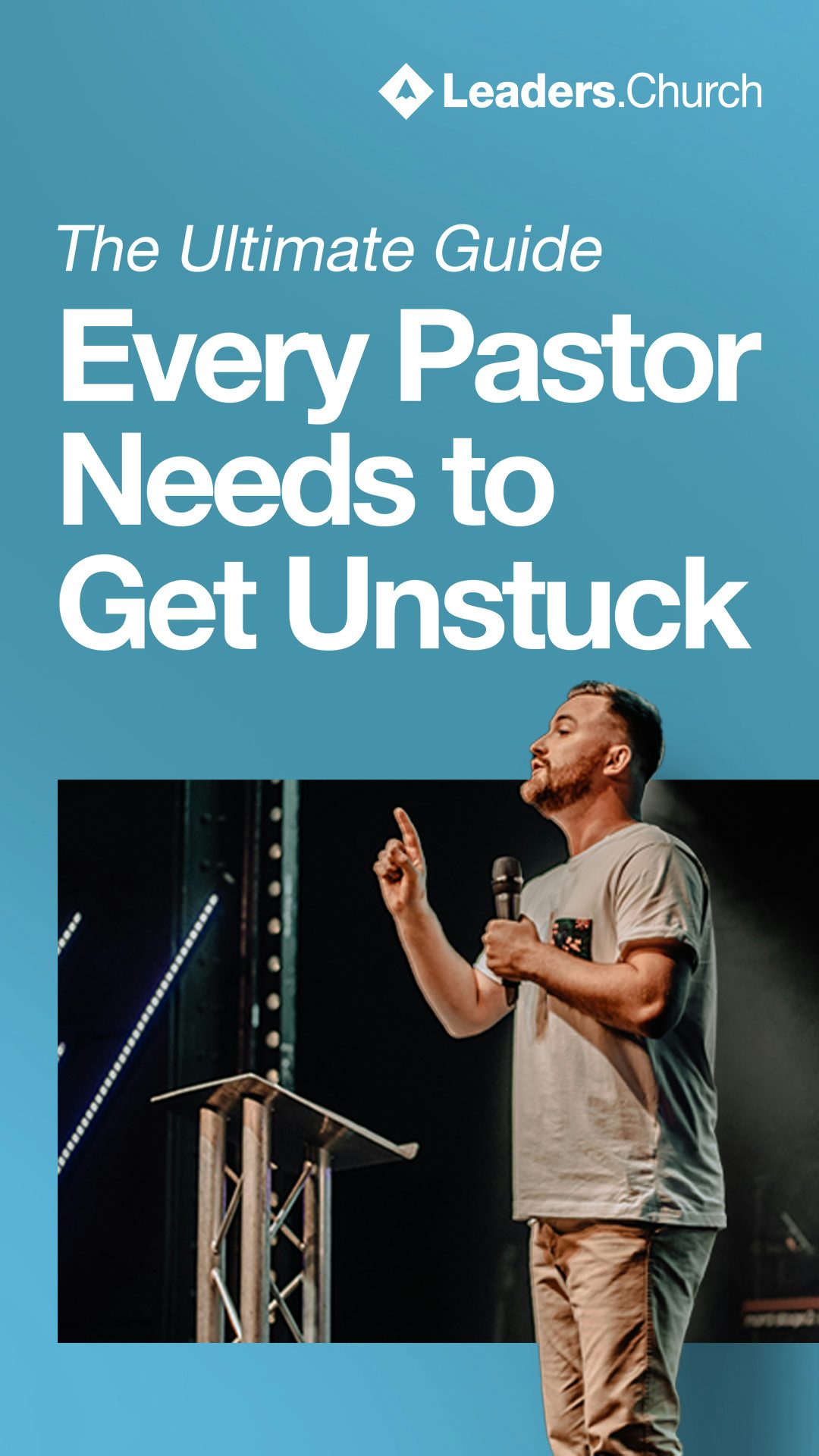007 – How to Balance a Church Budget
What’s in this Episode?
In any organization, the goal is to have more income than expenses, but what happens when the tithes drop and you have the same amount of expenses? How could the church make sure to balance the budget and not go into debt? Especially when it comes to smaller church contexts. Well, that’s exactly what we’re going to look at today.
Read the Transcript
Dick Hardy 0:26
Way back in the day, the American businessman and philanthropist John D. Rockefeller was asked, “how much is enough money?” He had a boatload of it and is answer: just a little bit more. And guess what? That’s the response that you have at your church too. How much is enough? Just a little bit more because we can do a little bit more ministry if we had more money. I hear it all the time. Man. We can’t do this Dick because we don’t have enough money. And certainly you don’t have an unlimited supply of money, the Lord does. You don’t. You have a defined decimal point of dollars and cents in your account. The issue is how well are you going to manage that money? How are you going to put together a budget? A budget is not a bad thing, by the way, a budget is something that will help you moving forward, take the resources the Lord’s given you, and be able to put them into play to really do the best you can for the ministry the Lord’s giving you
Jonathan Hardy 1:29
Yeah, that’s right. So today, we want to talk with you about six different things that you can do to help make sure that you balanced the budget. Now, when we’re talking about balancing the budget, we’re basically meaning you have more income than you have expenses, so simple as that. So, six ways to do this. Six things you need to do to make sure. Dick, kick it off for us.
Tip #1: Distinguish Between a Budget and a Financial Report
Dick Hardy 1:48
You bet, first of all, I really want you to distinguish between a budget and a financial report. Have it happen all the time, where a pastor will say to me, “well, you know, here’s our budget.” Well, he shows me income and expenses from last month. Well, okay, that’s what happened last month. That’s a financial report. But what did you project? “Well, this is our budget.” Well, no, a budget is forward looking. A budget said this is what we plan to bring in for tithes and offerings and missions. This is what we plan to spend. A financial report says, this is what we did bring in. This is what we did spend. So it will take you effort to put that together, but a budget is planning forward. So be sure you have that distinction.
Dick Hardy 1:48
Yeah, and you can’t just, you know, I know a lot of churches that just will look at their income and expenses, and they say, “okay, well, as long as you brought in more, we’re good.” Well, no, you need to have that plan that’s gonna set you up and it’s going to help you be a better steward of what you have because you’ve created a plan ahead of time.
Dick Hardy 2:50
Well, and the fact is if you don’t put a plan together, you’re sitting there looking at the financial statements saying, “well man, we’re $3,000 at hand here we can go and spend this money,” not factoring that all of a sudden you have a $10,000 expense coming at you, but a budget will tell you that.
Tip #2: Increase Income
Jonathan Hardy 3:03
Absolutely. Okay, so with that being kind of the framework, then we want to dive into some of the practical ways you can help balance the budget, and make sure that you have more income and expenses. And the second one today that I want to talk about is increasing income. You know, one of the things that we encourage people to do is, you know, teach on tithing. Teach on generosity. Help get people to understand how they can, you know, learn to grow in their giving and to make sure that they become generous givers. So, you need to teach on what the Bible says. What does the Bible say about giving and make sure that you are just preaching that, that you’re looking for ways to increase the income, and that’s going to be a big way to help you so you might not even have to change any expenses you have, if you can just do a couple things to give a boost on your income. In fact, we talked about that in our cultivating generosity video series as part of the Leaders.Church membership. You certainly could get that if you become a member or if you already are a member, make sure to check that episode out, that series out. You can also buy that individually if you just go to Leaders.Church. And in fact, we’ll give you a 50% off.. So you want to make sure to check that out. Point is, increase your income. That’s a way to help you.
Dick Hardy 4:30
And let me tell you a way not to increase your income. I just thought of this. This could be dangerous. Don’t guilt people into giving you money. People don’t want to give to your broken thing, whatever it is. People want to give because they’re being obedient to the Lord, because they want to buy into the mission, the vision, and not “hey folks, the air conditioner broke down, so we need to help you get more.” You’re not going to raise the kind of money you need to raise that way. So follow the advice Jonathan gave you there.
Tip #3: Decrease Expenses
Dick Hardy 5:02
Number three, decrease expenses. Now this is always the one, “well, we can’t cut expenses.” Well, let me tell you, if you’ll take a look, here’s what I recommend. Take a look at the last two years’ expenses, average them out per year. So maybe you have a line item that you spend, you know, $3,000 on such and such in a given year. Well, you might want to look at breaking that down into some smaller pieces. Let’s use a little larger number. So you got $10,000 and maybe you break that down into $4000 and $6000. And then you say, “hey, you know what? We could slice 5% off of each of those and not miss a beat. That’s what you need to do. You need to go line by line in the things where you spend money and look to chisel pieces off. Now, let me tell you what not to do. Don’t go to a fixed line and chisel it just so you can say on paper we’ve chiseled. Your mortgage is probably what your mortgage is. So don’t fiddle around with that. Even things like utilities. Now utilities, you can save if you’ll do some things with the way you’re managing, but don’t just all of a sudden say, well, we spent, you know, $6,000 on utilities last year. We’re going to spend $2000 this year. Well, no, probably not. Probably not. So you need to be smart when you do it. Go to the big ticket items. When there are sometimes times you could take a big ticket item out, but the point is, point by point by point you chisel a little bit off here. If you’ve done the thing Jonathan talked about with raising income, you can begin to get to a point of balancing and having more income than expenses.
Tip #4: Freeze Spending (Even on Budgeted Items)
Dick Hardy 6:42
Then, freeze, sometimes even budget items. So you know, if you’re on a calendar year, maybe you’ve put this $10,000 deal in place, and it’s budgeted, but you reach April and you say money is falling behind, and so you say to the players, “even though it’s budgeted, we’re not going to spend it.” Or “we’re not going to spend it now, we’re going to let things catch up.” And that can be an effective way to decrease your expenses.
Jonathan Hardy 7:17
Okay, what’s number five?
Tip #5: Ask Department and Groups to Pick Up Expenses Personally
Dick Hardy 7:18
Number five, ask departments and groups to pick up expenses personally. Now I know, this gets a little touchy. Because you don’t want to throw the small person under the bus here. But sometimes churches will subsidize things for people who are doing events. And by the way, you start with the oldest group. So if you’re subsidizing children, subsidize youth, subsidizing adults, say in their curriculum, say in camps, start with adults. And you just stop subsidizing adults. Adults, generally, would have the ability to pay and so you say okay, maybe it’s a temporary thing. Maybe for six months or for this year, you’re going to stop subsidizing. When you’re getting to youth and children’s subsidy, cutting those subsidies, you want that to be a last resort. But sometimes you have to do that. And but then you always want to have your antenna up for the hardship case. You don’t want anybody to not get ministry, because you had to cut the budget, but their personal situation is such that if they didn’t have a subsidy, so you just have to think that all the way through. You can do it, but you’ve got to think about it.
Tip #6: Build Cash Reserves
Jonathan Hardy 8:34
Yeah. All right. And then the final thing, the sixth tip that we want to give you here for balancing a budget is to build cash reserves. And the reason you need to do this is because there’s always a push in a pull, there’s an ebb and flow. And with income, there’s an ebb and flow and people move away and you have a loss of income, then new people come and you have an increase in income. And so if you could work to build some cash reserves that can help you bridge those gaps when you have a little bit of a dip, and so it’s just like in personal expenses, people always recommend that you have, you know, six or three months of reserves ready to go to cover expenses when needed. You want to do the same thing as a church, you need to have reserves built up. And that’s going to help you make sure that you’re always balancing that budget, because the goal always is to have more income and expenses, you want to never be spending more than you are bringing in to where you’re eventually going into debt. That’s not good. And that sets you up in a bad place. So you have to make sure you have the cash reserves.
Recap
Jonathan Hardy 9:32
So, in short, let me give you a quick summary of these things here. We have the first thing: distinguishing between a budget and financial report, increase income, decrease expenses, freeze spending (even budgeted items), ask departments or groups to pick up expenses personally, rather than the church subsidizing. And then finally, building cash reserves. So Dick, what else?
Dick Hardy 9:54
Well, if you’ll do these things, you’ll see it’s not going to happen overnight. By the way, you know, if you haven’t been doing these things it’s gonna take you some time, but if you start doing these things I’ll tell you, 90 days from now, you’ll start to see things feel better. So you got to get it started and start with one piece, start with two pieces. Just get started and you’ll see good things happen. I will say to, you as the leader I have to lead the charge with this. You’ve got to help people understand because you’re gonna have some people that don’t understand money, they don’t understand budget, they say, “well pastor, why are you doing this?” You know, we’re just about the ministry, we’re not all about money. Well listen, without money you know, you’re not gonna do any ministry, you don’t get paid, nothing’s happening. So, and the Lord has provided that for us.
Dick Hardy 10:43
Part of your role as a leader is to step up and lead and that’s one of the reasons why, here at Leaders.Church, we recommend that you jump in personally to the Five Day Leadership Challenge for pastors, because this is going to help you be better as a leader. Just go to Leaders.Church/challenge and you can jump right in. This will become day one of your five day challenge. You’re gonna get a video sent to you every day, digitally, and you’ll take 15 minutes and invest in you, because when you invest in you, then you get better, you get stronger, the church is able to get better, get stronger, your finances get better, everything just all ripples out of there. Also, be sure that you subscribe to a podcast platform and YouTube. We want to get the church tips to you every way we can. Certainly spread the word to your friends, your pastor friends, because church tips is designed to help you get better, break barriers, and grow your church. Anything else?
Jonathan Hardy 11:43
That’s it!
Dick Hardy 11:43
We’re good to go. Thanks very much for hanging with us today. Make it a great one and be blessed.
Subscribe & Follow:
- Subscribe on Apple Podcasts
- Follow on Spotify
- Subscribe to YouTube Channel
- Subscribe on Google Podcasts
- Like us on Facebook
- Follow us on Instagram
- Follow us on Twitter
Other Resources:
- Leaders.Church
- Leaders.Church Blog
- Church University
- Take the Free 5 Day Leadership Challenge for Pastors
- Get Free Access to the 4 Secrets Masterclass









